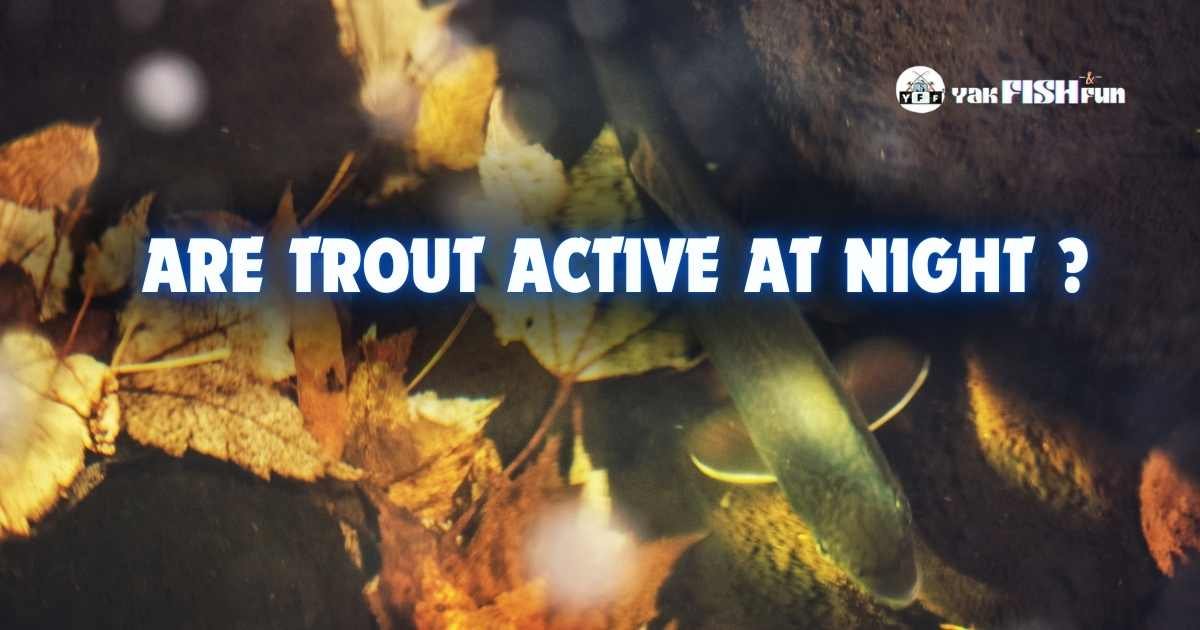Trout fishing is a beloved pastime for many anglers, often associated with the calm, early morning hours as the sun begins to rise. However, a question that intrigues many fishing enthusiasts is whether trout are active at night.
Yes, trout are active at night. They often feed during nocturnal hours, especially in warmer seasons.
This nocturnal inquiry opens up a whole new world of fishing possibilities, revealing secrets and techniques that could enhance your fishing experience.
Trout fishing isn’t just a daytime activity. Many anglers find success fishing for trout at night. Trout becomes more active after sunset due to cooler temperatures and reduced light. This makes them more likely to venture out from their hiding spots.
So, anglers often use glow-in-the-dark lures or baits to attract trout. Safety is crucial, so always use proper lighting and stay aware of your surroundings. Night trout fishing offers a rewarding challenge for dedicated anglers.
In this article, we will dive into the behavior of trout after the sun goes down, exploring their nocturnal habits and offering tips on how to successfully catch trout under the moonlight.
Table of Contents

Are Trout Nocturnal – What Do They Do In The Dark?
Trout exhibit increased activity during nighttime hours. They often hunt for food and navigate their habitats in the dark. Anglers may find greater success fishing for trout after sunset.
But are trout nocturnal? No. Trout are not strictly nocturnal, but they do exhibit significant activity during nighttime hours. While they are known to feed actively during dawn and dusk—periods known as crepuscular feeding times—they can also be quite active at night. Several factors contribute to this behavior, making nighttime a prime opportunity for anglers.
Anglers often wonder about the activity patterns of trout after the sun sets. Understanding their nocturnal habits can lead to more successful fishing adventures. So, are trout actually active at night? Let’s dive into their nighttime behavior.
Nighttime Feeding Habits
Trout does feed after dark. During the day, especially in clear water and bright sunlight, trout tend to be more cautious and seek cover to avoid predators. At night, with reduced visibility, they feel safer venturing out to feed. This is particularly true in heavily fished waters where trout may have learned to associate daylight with danger.
Here’s a breakdown of their feeding habits during nighttime hours:
- Low Light Conditions: Trout take advantage of low light to ambush prey.
- Cooler Temperatures: Nighttime brings cooler water temperatures, encouraging trout to be more active.
- Reduced Predation: Darkness offers some protection from predators, making trout bolder.
Movement And Habitat At Night
Trout’s movement and habitat preferences shift slightly once the sun goes down. They adapt to the dark environment in several ways:
- Shallow Waters: Trout often move to shallower waters at night.
- Increased Activity: They become more active, searching for food.
- Hiding Spots: Trout seek out hiding spots to rest and avoid predators.
Temperature Regulation
In warmer months, trout may seek cooler water temperatures that prevail at night. As cold-water species, they are more comfortable and active in cooler conditions, which can make night fishing more productive.
How Anglers Can Adapt
Fishing for trout at night requires different strategies. Anglers should consider these tips to increase their chances of success:
- Use of Lures: Opt for lures that mimic nighttime prey.
- Quiet Approach: Move quietly to avoid spooking the fish.
- Target Areas: Focus on shallow waters and known feeding spots.
By understanding trout’s nighttime behavior, anglers can enhance their fishing experiences. Whether it’s their feeding habits or movement patterns, knowing what trout do in the dark is key.
Different Types Of Trout And The Best Times To Night Fish For Each
Trout remain active at night, with brown trout often biting after dusk. Rainbow trout and brook trout prefer early evening hours.
Trout fishing at night can be thrilling. Knowing the best times to fish for different types of trout can make your experience even better. Let’s dive into the specifics for each variety.
Rainbow Trout
Rainbow trout are popular for night fishing. They are active during specific nighttime hours.
- Early Evening: Rainbow trout often start feeding just after sunset.
- Midnight Hours: They can be quite active around midnight.
- Pre-Dawn: The hours before sunrise can also yield good catches.
Brown Trout
Brown trout are known for their nocturnal behavior. Here’s when to target them.
- Dusk: Brown trout begin feeding as the light fades.
- Late Night: They remain active until the early hours of the morning.
- Moonlit Nights: Bright nights can enhance their activity.
Brook Trout
Brook trout can be a bit elusive at night. Timing is key to success.
Brook trout are less predictable but can still be caught during these times:
- Early Night: Try fishing shortly after dark.
- Cloudy Nights: Overcast conditions can increase their activity.
- Quiet Waters: Look for calm and undisturbed water areas.
Lake Trout
Lake trout are deep-water dwellers, but they can be caught at night with the right approach.
- Twilight: Fish during the transition from day to night.
- Deep Waters: Focus on deeper sections of the lake.
- Cooler Nights: They are more active in cooler temperatures.
Cutthroat Trout
Cutthroat trout can offer a rewarding night fishing experience. Here’s when to find them.
Cutthroat trout are often more active during the following periods:
- Early Night: Just after sunset, they begin feeding.
- Windy Nights: A slight breeze can stir up their activity.
- Rocky Areas: Target rocky shorelines or structures.
Fishing for trout at night requires patience and timing. Each type of trout has its own peak activity periods, and understanding these can significantly improve your chances of a successful night fishing adventure.
The Pros And Cons Of Night Fishing For Trout
Trout exhibit increased activity at night, offering anglers a unique fishing experience. Night fishing can yield impressive catches but poses challenges due to limited visibility.
Fishing for trout at night can be an exciting and rewarding experience. Many anglers swear by the tranquility and unique challenges it offers. However, it’s essential to weigh the benefits and drawbacks before heading out under the moonlight.
Benefits Of Night Fishing For Trout
Fishing at night has its unique perks. Here are some of the key benefits:
- Less Competition: Fewer anglers: Most people fish during the day, so you’ll have more spots to yourself.
- Cooler Temperatures: Avoiding the heat: Nighttime fishing can be more comfortable during hot summer months.
- Active Fish: Increased trout activity: Certain trout species are more active and feed aggressively at night.
- Unique Experience: Tranquil environment: The serene ambiance of night fishing offers a different kind of relaxation.
Challenges Of Night Fishing For Trout
While night fishing can be rewarding, it also presents several challenges. Let’s delve into some of these:
Fishing in the dark can be tricky. Limited visibility makes navigation and casting more challenging. Safety becomes a critical concern, as accidents are harder to manage at night.
Essential Gear For Night Fishing
Proper equipment is crucial for a successful night fishing trip. Here are some items you shouldn’t forget:
- Headlamp: Hands-free lighting: Essential for tying knots and handling gear in the dark.
- Glow-in-the-Dark Lures: Visibility: These lures attract trout even in low light conditions.
- Warm Clothing: Temperature drops: Nights can get chilly, so dress in layers to stay warm.
- First Aid Kit: Safety first: Be prepared for any minor injuries or accidents.
Best Techniques For Night Fishing
Certain techniques work better at night. Here are a few methods that can boost your success:
Night fishing requires patience. Slow down your retrieval to mimic natural prey movements. Use baits that emit light or sound to attract trout. Position yourself near areas with underwater structures where trout tend to hide.
Fishing for trout at night offers a unique set of pros and cons. By being well-prepared, you can make the most of this thrilling experience.
Tips To Maximize Your Trout Catch At Night
Trout are surprisingly active at night, making it an ideal time for fishing enthusiasts. Focus on well-lit areas near docks and use glow-in-the-dark lures to attract them. Adapting your technique to nighttime conditions can significantly increase your catch.
Fishing for trout at night can be an exciting adventure. The tranquility of the evening combined with the thrill of a potential catch makes it an unforgettable experience. But how can you ensure success when the sun goes down? Here are some valuable tips to help you maximize your trout catch at night.
Ideal Locations For Night Fishing
Finding the perfect spot is crucial for night fishing. Here’s what to consider:
- Shallow Waters: Trout often move to shallow areas at night: Easier for feeding.
- Near Vegetation: Look for spots with underwater plants: Trout hide and hunt there.
- Inlets and Outlets: Search areas where water flows in and out: Attracts more food for trout.
You can also read this guide on How To Identify A Good Spot For Kayak Fishing for details.
Effective Techniques For Night Fishing
Employing the right techniques can greatly increase your chances of landing a trout after dark. Here are some proven methods:
- Use Glow-in-the-Dark Lures: These lures attract trout in low light: Enhance visibility.
- Slow Your Retrieve: Fish more slowly at night: Trout are less aggressive.
- Employ Scented Baits: Use baits with strong odors: Helps trout locate them in the dark.
Best Times To Fish At Night
Timing is everything. Knowing when to fish can make a huge difference:
- Dusk to Midnight: Fish actively feed during these hours: Higher chances of catching trout.
- Moonlit Nights: The presence of the moon can improve visibility: Easier to spot and catch trout.
- Warm Nights: Trout are more active in warmer temperatures: Increases their feeding activity.
Essential Gear For Night Fishing
Having the right gear ensures a successful and safe night fishing trip. Essential items include:
- Headlamp with Red Light: Keeps your hands free: Red light preserves night vision.
- Thermal Clothing: Keeps you warm: Nights can get chilly.
- Reliable Net: Helps secure your catch: A sturdy net prevents escape.
Safety Tips For Night Fishing
Fishing at night requires extra precautions. Here are key safety measures:
- Always Fish with a Buddy: Reduces risk: Ensures help is available if needed.
- Know the Area: Familiarize yourself with the location to prevent getting lost.
- Keep a Charged Phone: Essential for emergencies: Ensures you can call for help.
By following these tips and techniques, you can enhance your night fishing experience and increase your chances of catching trout. Happy fishing!
The Best Lures And Baits For Trout Fishing At Night – What Bait To Use For Night Fishing For Trout
Trout remain active at night, making it an excellent time for fishing. Nightcrawlers and minnows are effective baits for nocturnal trout. Glowing lures can also enhance your success in dark waters.
Fishing for trout at night can be an exhilarating experience. The tranquility of the night, combined with the mystery of what lurks beneath the water’s surface, makes it a unique adventure. But what lures and baits work best when the sun goes down?
Let’s dive into the top choices for nighttime trout fishing.
Glow-in-the-dark Lures
Glow-in-the-dark lures are essential for night fishing. Their luminescence attracts trout in low-light conditions.
- Spoons: These mimic small fish and have a reflective surface.
- Soft plastics: Often infused with glow particles, ideal for mimicking worms or grubs.
- Spinners: Their rotating blades catch the moonlight, making them hard to resist.
Live Bait Options
Live bait can be incredibly effective for night fishing. Here are some top choices:
- Nightcrawlers: These large worms are easy for trout to spot and smell.
- Minnows: Small fish that trout naturally prey on.
- Leeches: Their movement in the water is irresistible to trout.
Scented Baits
Scented baits can enhance your chances of a catch. They release an aroma that trout find attractive.
- PowerBait: Available in various scents and colors, it’s a favorite among anglers.
- Garlic-infused baits: Strong-smelling and effective in murky waters.
- Shrimp-scented baits: Mimics the smell of natural trout food.
Artificial Flies
Artificial flies can be used effectively at night. Their design mimics the insects trout feed on.
- Streamers: Mimic small fish and are great for deeper waters.
- Nymphs: Imitate aquatic insects, perfect for slow-moving water.
- Dry flies: Float on the surface, ideal for calm, clear nights.
Jigs And Soft Plastics
Jigs and soft plastics are versatile and effective for nighttime trout fishing. They can be fished at various depths and conditions.
- Marabou jigs: Mimic small baitfish with their flowing tails.
- Twister tails: Their curly tails create vibrations in the water.
- Tube jigs: Versatile and can be fished in various ways.
Tips For Using Lures And Baits At Night
Success with night fishing depends on a few key tips. Here’s what to remember:
- Slow retrieval: Trout are less aggressive at night.
- Stealth: Quietly approach the water to avoid spooking fish.
- Use a headlamp: Helps with tying knots and handling fish, without scaring them away.
What Time Are Trout Most Active?
Trout are most active during early morning and late evening. They prefer cooler water temperatures and low light conditions.
How Do You Catch Trout At Night?
Use glow-in-the-dark lures or bait. Fish near structures like rocks or logs. Move quietly to avoid spooking trout. Use a headlamp for better visibility. Adjust techniques based on water conditions.
Do Trout See In The Dark?
Trout have limited vision in the dark. They rely on their lateral line to detect movement and vibrations.
What Colors Do Trout See Best At Night?
Trout see best in blue and green at night. These colors penetrate water deeper, making them more visible to trout.
Bottom Line
Trout activity at night can be unpredictable, but many anglers enjoy night fishing for its unique benefits. Cooler water, less light, and fewer people fishing can make trout more active and willing to bite. Knowing how trout behave in different places and seasons can help you improve your night fishing success. Using the right gear and techniques, and staying safe, can make night fishing for trout both productive and fun. So, next time you’re planning a fishing trip, think about the advantages of fishing under the stars.


